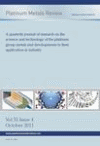-
oa Royal Commission Report on Diesel Emissions
- Source: Platinum Metals Review, Volume 35, Issue 4, Oct 1991, p. 187 - 187
-
- 01 Jan 1991
Preview this article:






Royal Commission Report on Diesel Emissions, Page 1 of 1
< Previous page Next page > /docserver/preview/fulltext/pmr/35/4/pmr0035-0187-1.gif
There is no abstract available.
© Johnson Matthey


